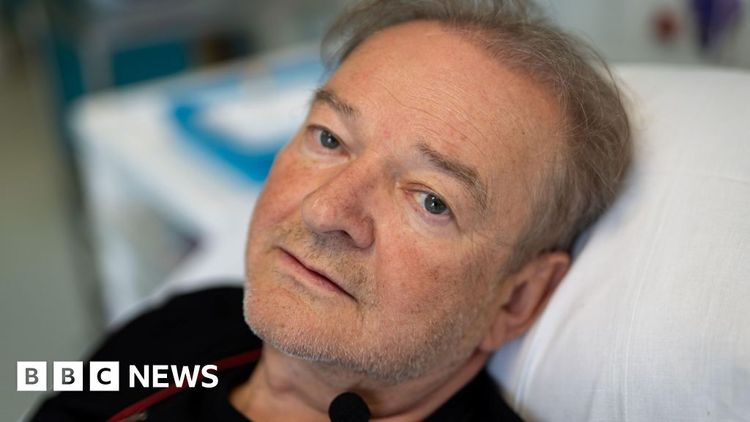Promising lung cancer vaccine trial starts in UK

Janusz Racz, aged 67, expressed his willingness to experience new things.
A man who is 67 years old is the first person in the UK to test a new treatment for lung cancer. This treatment is a vaccine that teaches the body how to battle and eliminate the disease. Doctors are hopeful that this new treatment will be a game-changer in the fight against lung cancer.
It utilizes the identical mRNA technology found in certain Covid vaccines to provide guidance for the immune system.
The initial trial that Janusz Racz is participating in will assess the safety of the injection.
34 different research facilities in seven countries, such as University College London Hospitals NHS Foundation Trust in the United Kingdom, will enroll 130 participants to test the treatment.
The therapy needs to focus on attacking only the cancerous cells while leaving the healthy ones unharmed, with the aim of reducing the chances of experiencing negative reactions.
The blog describes various indicators discovered on the exterior of lung cancer cells that help educate the patient's immune system on what to target and combat.
The BNT116 vaccine, developed by a biotechnology firm based in Germany called BioNTech, has the potential to significantly impact the situation, according to specialists.
Dr. Siow Ming Lee, who is in charge of overseeing the UK portion of the trial, shared with the BBC's Today program: "Our goal is to initiate a new era in treating lung cancer with mRNA cancer vaccines.
It is our hope that by adding an extra immune boost to the current standard treatment of immunotherapy and chemotherapy, we will see positive results.
Mr Racz, who is from London, expressed his willingness to experiment with different experiences.
I am optimistic that this treatment will offer protection against cancer cells. Additionally, I believe that my involvement in this study may benefit others in the future and contribute to making this therapy more accessible to a larger audience.
Being a scientist, I understand that the progress of science relies on individuals being willing to take part in initiatives such as this one.
Mr. Racz, who specializes in artificial intelligence, received a diagnosis of lung cancer after experiencing breathing issues that he believed to be related to asthma.
During a routine medical test (for a different problem), doctors discovered a growth on his right lung.
The national cancer director of NHS England, Dame Cally Palmer, described these types of injections as potentially groundbreaking in protecting individuals from their own cancers and reducing the risk of the disease resurfacing.
Being told you have cancer is really scary, but having the chance to take part in cutting-edge medical studies is one way to find hope. Other new methods of detecting and treating cancer sooner are also giving patients more reasons to be optimistic.
She mentioned that in the coming years, they anticipate a significant increase in the number of patients participating in trials.
The study will enroll individuals with non-small cell lung cancer (NSCLC) at various stages of the disease, from early stages before surgery or radiotherapy to advanced stages or recurrent cancer. Participants will receive the vaccine in addition to standard immunotherapy.
Other hospitals in the United Kingdom are also participating in this initiative.
There are many additional vaccines that are currently being employed in the fight against various forms of cancer.
In contrast to vaccines that prevent diseases like measles, cancer treatment vaccines are designed for individuals who are already sick with cancer.
Cancer vaccinations assist your immune system in identifying and fighting off cancerous cells.
Some of these treatments, including the most recent one, are created using typical characteristics found exclusively on cancer cells. Meanwhile, there are also personalized treatments developed specifically for each individual's unique tumor.
Michelle Mitchell, the head of Cancer Research UK, expressed her satisfaction with the opening of a new trial for a cancer vaccine in the UK, as it will give more patients the opportunity to benefit from advanced treatments.
The scientific breakthroughs that have guided us through the peak of the Covid-19 crisis are proving to be a hopeful avenue for potential medical treatments for patients.
"Although it is still in the beginning phases, we are excited to see the development of the study."
Signs And Symptoms Of Lung Cancer
Lung cancer continues to be the top reason for cancer-related deaths globally, claiming around 1.8 million lives in 2020. The most prevalent form of lung cancer is non-small cell lung cancer.
In the beginning, there are typically no indications or warnings, but reasons to consult a doctor include:







































